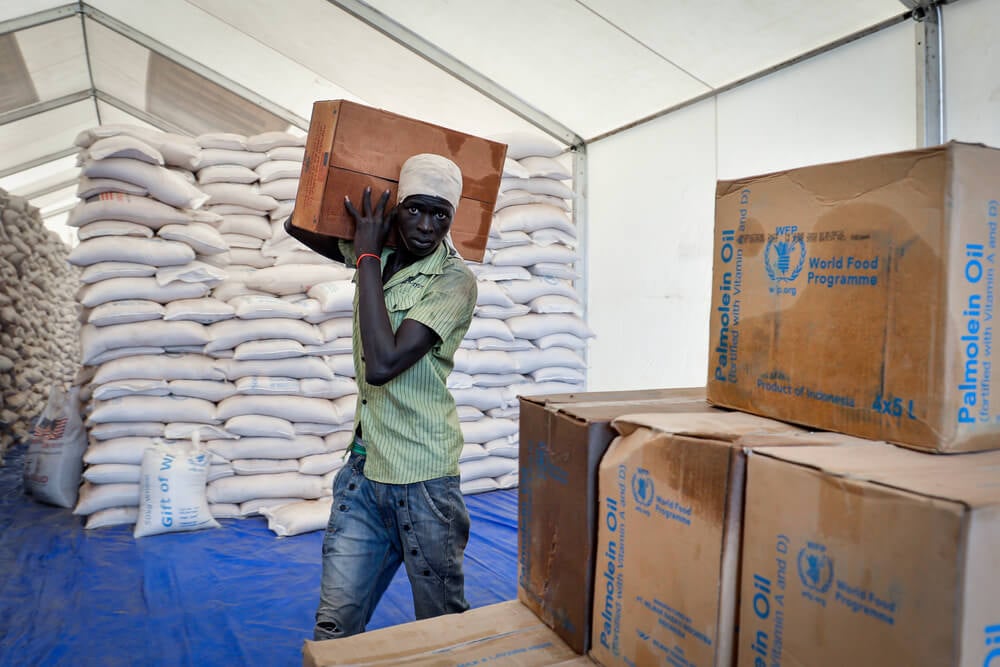While the world waits for how Donald Trump’s presidency may disrupt global affairs, few would bet against the continued neglect of millions of people facing severe hunger exacerbated by extreme weather and conflict.
Will more countries listen to the UN’s exhortations to prioritise conflict resolution, economic support and climate adaptation to avert famine and catastrophe? “It’s time for world leaders to step up and work with us to reach the millions of people at risk of starvation,” said Cindy McCain, executive director of the World Food Programme.
Few believe Trump will galvanise such action. Rich countries in any case are likely to be preoccupied with whether the new president will impose steep trade tariffs that could shock the global economy.
The Africa Center for Strategic Studies, an academic institution within the US Defence Department, said last month that 80% of the record 163 million Africans facing acute food insecurity were in conflict-affected countries, including close to a million people in Sudan, South Sudan and Mali.
Acute food insecurity equates to risk category 3 or higher, meaning crisis, emergency and catastrophe, on the Integrated Food Security Phase Classification scale of 1 to 5 used by the UN and others.
There are a total of 22 Hunger Hotspots around the world and starvation and death are likely in five of them - Sudan, South Sudan, Mali, Gaza and Haiti, say the UN Food and Agriculture Organisation and World Food Programme. Of “very high concern” are Nigeria, Chad, Yemen, Mozambique, Myanmar, Syria and Lebanon.
Starting this month until next March, the La Niña weather pattern could cause floods in Nigeria or South Sudan and drought in Somalia, Kenya and Ethiopia, say the UN agencies.
Since the last Hunger Hotspots report in June, Kenya, Lesotho, Namibia and Niger, Burkina Faso, Ethiopia, Malawi, Somalia, Zambia and Zimbabwe have joined the list.
Will Trump withdraw from the COP process?
The first big test of international resolve, or the lack of it, will come when climate negotiators meet on 11 November at COP29 in Baku. Critics were already saying that the choice as host of oil-rich Azerbaijan, and the United Arab Emirates for the previous meeting, had already lowered the integrity of the proceedings.
COP29 will be led by Mukhtar Babayev, Azerbaijan’s ecology and natural resources minister who has a long record in developing the country’s oil industry.
Now there is a real fear that Trump will again withdraw from the COP process and Paris Agreement to cut emissions while disavowing previous climate commitments.
At COP29, countries are supposed to provide updated plans to reduce greenhouse gas emissions
“The world is now dangerously close to breaching its target of limiting global multi-year mean heating to 1.5°C,” said The Lancet Countdown on health and climate change on 29 October.
It said there were record highs in ten indicators monitoring climate-related health hazards, including heat-related mortality of people older than 65 years increasing by a record-breaking 167% compared with the 1990s.
At COP29, countries are supposed to provide updated plans to reduce greenhouse gas emissions, known as Nationally Determined Contributions. The new US president may also be reluctant to dig deep to replace the previous $100 billion annual commitment in climate finance for developing countries.
Richer countries are cutting their foreign aid budgets
The world’s poorest and most climate-vulnerable countries are spending more than twice as much to service their debts as they receive to fight the climate crisis, according to analysis by the International Institute for Environment and Development.
“Given the scale of climate-induced displacement and human rights violations in Africa, half-measures and lip service are not enough from the richer countries who caused this crisis,” said Tigere Chagutah, Amnesty International’s Regional Director for East and Southern Africa. “The countries responsible for climate change, along with international finance institutions, must follow through and deliver the needed resources. Africa cannot wait any longer.”
 Many richer countries are cutting their foreign aid budgets
Many richer countries are cutting their foreign aid budgets
All this when the UN says this year was the second to see a decline in funding for humanitarian assistance, with 12 appeals facing shortfalls of more than 75% including for Ethiopia, Yemen, Syria and Myanmar.
Many richer countries are cutting their foreign aid budgets. UK aid will drop from 0.58% in 2023 to 0.5% of GNI for the next two financial years, says the medical group MSF. “Repeated cuts by successive governments to an already depleted aid budget has had a catastrophic impact on the health needs of people around the world,” said Natalie Roberts, executive director of MSF UK.
800 million people are experiencing hunger
Somalia at least received some relief from the outgoing Biden administration. On 5 November, the US and Somalia signed an agreement formalising debt cancellation worth $1.14 billion.
The move was part of an IMF/World Bank programme to relieve the poorest countries of unsustainable debt and it is hard to imagine Trump following suit.
By 2050, the global population will be 10 billion people, requiring a 60% increase in food production amid accelerating climate change, says the World Bank.
Some 2 billion people are not guaranteed access to safe drinking water, 800 million are experiencing hunger, and 2.5 billion are overweight
The food sector already accounts for 30% of greenhouse gases while governments give around $650 billion a year in subsidies and other transfers to maintain the current food system.
Food and fertiliser trade restrictions have increased and as of October, 16 countries had implemented 21 food export bans and 8 countries had 15 export-liming measures, said the World Bank.
Meanwhile, some 2 billion people are not guaranteed access to safe drinking water, 800 million are experiencing hunger, and 2.5 billion are overweight, says the UN Human Rights Council.
But is anyone listening?